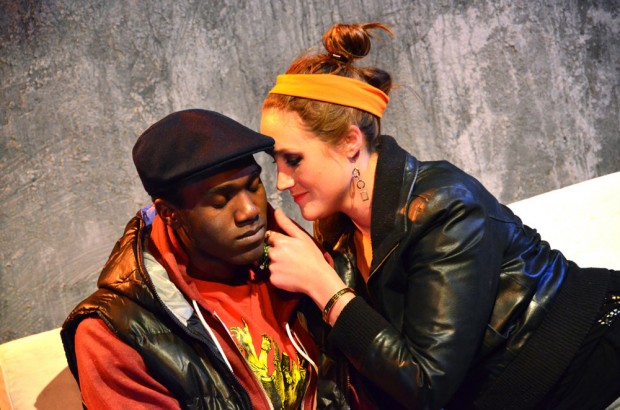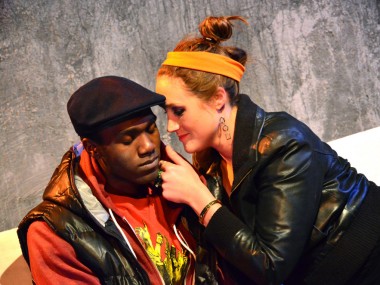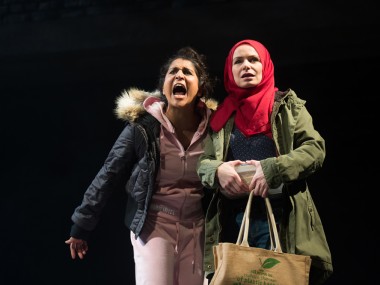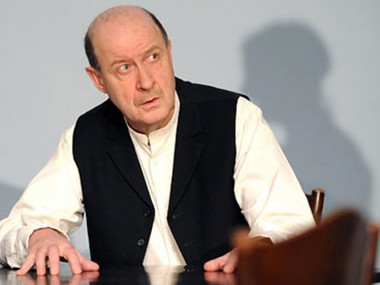Fog, Finborough Theatre
Thursday 5th January 2012

Absent or abusive fathers are a staple of British drama. As such, they are both an explanation for ferocious male violence and a metaphor of a paternal state which, in an age of austerity, seems ready to abandon the needy to their own devices. In Tash Fairbanks and Toby Wharton’s punchy play, which is a remarkable collaboration between a woman born in 1948 and a man born in 1984, the consequences of a father’s abandonment of his children are played out with chilling logic.
The plot reads like a social worker’s case history: Cannon, a soldier with the Parachute Regiment, abandons his two children — Fog and Lou — to the care system when his wife dies. He rejoins the army, becoming a sergeant. When Fog leaves the institution that cared for him at 17, his father returns and helps to set him up in a squalid flat. Despite this belated help, it rapidly becomes clear that Fog is a very disturbed young man. He steals a knife; he wears a crucifix; he misses his Super Mario game; he thinks he’s living in a war zone. But if his vicious father is not a good role model, then neither is his older sister, Lou, who has survived the care system by developing an attitude, an aggressive and assertive personality which in the end does her no favours at all. She has had issues with sexual abuse and with drugs. Her scars are fresh, and ready to burst at any moment.
But while Fog tries to become a gangsta, his only friend Michael, a studious black teenager who hopes to go to Oxford University, is a complete contrast. In defiance of cliché, he studies hard; he wants to be a psychologist; he is aspirational. Likewise, his older sister Bernice is doing well at work, and hopes to be promoted soon. Not surprisingly, she doesn’t have much time for Fog. The contrast between these two families is deftly sketched out, although it could have done with some more detail.
As a picture of Britain, the play focuses on Cannon’s experience of serving his country and then returning to find that it is unrecognisable (shades of Simon Stephens’s Motortown in 2006). He recoils from the run-down estates, with their blocks incongruously named after English romantic poets, symbols of a society where the max an ex-squaddie can hope to earn as a security guard is 12K. Most of all, he realises that no one cares. He may have abandoned his kids, but England has left them all to fend for themselves.
At its best, the language of the play feels like it’s been inhaled through a water pipe and then exhaled to the beat of drum ’n’ bass. It burns, it stings, it makes your blood tingle. Linguistically, this is a tale of bluds, bruvs and boffins. And there’s an intensity and a rush to the dialogue that gives the work its emotional punch. Although the white kids posture and speak like black kids, the slang explodes in the face of truth, and there is plenty of that.
Fired up by this linguistic energy, Fog is sometimes frightening in its anger and desperation. Although it rushes along like roach flushed down a plughole, it’s not perfect by any means. The plot is too simple, and the two female characters are seriously underwritten. Yet Ché Walker’s sizzling production, on Georgia Lowe’s unyielding concrete slab of a set, features unforgettably powerful scenes from a thoroughly committed cast.
As Fog, co-author Toby Wharton excels in his portrayal of nervy neediness, his wired but puny physique a telling contrast to Victor Gardiner’s muscular, tough Cannon, who looks convincingly like a Forces boxer. At the same time, Benjamin Cawley lends Michael a quiet coolness while Kanga Tanikye-Buah’s Bernice and Annie Hemingway’s Lou make the most of their smaller roles. Together, they tell a story that leaves you stunned by its violence, and its terrible sadness.
This review first appeared on The Arts Desk




